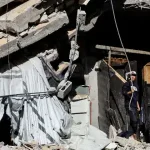TEHRAN: Due to Iran’s response to more than four months of protests, the EU and Britain have increased sanctions against the Islamic republic, resulting in a sharp decline in relations between Iran and Europe.
Separately, the United States increased its pressure on Tehran regarding its repression of protests on Monday by imposing sanctions on the Islamic Revolutionary Guard Corps Cooperative Foundation and senior Iranian officials.
Iran’s relations with the West have been strained for a long time due to a variety of issues, including its disputed nuclear program, its involvement in regional conflicts, and the detention of foreigners and dual nationals.
But relations have worsened as Iran has taken action against what it calls “riots” caused by Mahsa Amini’s death after she was arrested for allegedly violating Iran’s dress code for women.
Tehran has accused Western powers of “inciting the protests and riots” due to what it considers to be the tough stance taken by Britain, France, and Germany.
Since the beginning of the protests, the EU has imposed its fourth round of sanctions on Tehran, putting 37 more Iranian officials and organizations on a blacklist with asset freezes and visa bans.
Britain added five more Iranian officials to its list of sanctioned individuals on the same day, bringing the total to 50.
Despite requests from Germany and the Netherlands, the 27-nation EU has yet to blacklist Iran’s Islamic Revolutionary Guard Corps as a terrorist organization.
Some EU officials are concerned that such a move could kill off stalled efforts to revive the 2015 agreement on Tehran’s nuclear program. Iran has warned the bloc against taking such a move.
Josep Borrell, the head of EU foreign policy, insisted that an EU member state’s legal ruling was required before the group could move.
Additionally, a number of European nations are mobilizing to secure the release of their citizens held in Iran, some of whom are being held on suspicion of spying.
Iran’s “policy of hostage taking” was condemned on Monday by Belgium and France, both of which have inmates in Iran.
Additionally, Western nations have asserted that Iran has denied providing Russia with armed drones specifically for use in the Ukraine conflict.
The view from Iran
Since the beginning of the protest movement that was sparked by the death of Iranian Kurd Amini, Europe’s severe criticism has enraged Tehran.
On the psychological, media, and economic fronts, senior Iranian officials on Sunday accused the Europeans of waging “a hybrid war against the Iranian nation.”
Fayaz Zahed, an Iranian professor of international relations at the Islamic Azad University in Tehran, claims that Germany has also “adopted tough and radical positions against Iran.” He stated that this was in contrast to the times when Berlin was a pillar of maintaining dialogue with Tehran when Angela Merkel was chancellor.
He argued that governments’ efforts to normalize relations with Tehran have been hampered by the fact that “the issue of Iran has become central in Western public opinion,” making it difficult.
Nasser Kanani, a spokesperson for the Iranian foreign ministry, asserted that “some European countries, including Germany, have chosen the path of provocation to incite the protests and riots” with the intention of “stir up instability” in Iran.
On Sunday, Iran’s top diplomat, Hossein Amir-Abdollahian, compared the position taken by Britain, France, and Germany, which it considers to be more hostile, to that of its longtime adversary, the United States.
Can the crisis get worse?
Abbas Aslani, a broadcast journalist and political analyst from Iran, predicted that the EU would revoke the Guards’ terror list because “it risks opening another crisis, in particular in the field of energy, in the midst of the war in Ukraine.”
In the meantime, efforts to revive the frayed nuclear deal, under which Iran was promised sanctions relief in exchange for restrictions on its nuclear program, have been on hold for a number of months.








